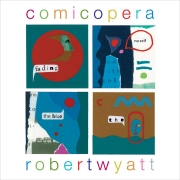Robert Wyatt, "Comicopera"
 Judged solely by his recordings, Wyatt seems a low-key, wry, extraordinarily loyal and honest person. Yet opinions about his work probably cover a range comprising love, surprise that he's still alive, disinterest, and hate. For sure there are conflicting verdicts on his voice. Love it, like it in small doses, or loathe it, Wyatt's hasn't changed a great deal since the late 1960s. It remains a singularly unadorned expression of our flawed humanity.
Judged solely by his recordings, Wyatt seems a low-key, wry, extraordinarily loyal and honest person. Yet opinions about his work probably cover a range comprising love, surprise that he's still alive, disinterest, and hate. For sure there are conflicting verdicts on his voice. Love it, like it in small doses, or loathe it, Wyatt's hasn't changed a great deal since the late 1960s. It remains a singularly unadorned expression of our flawed humanity.
Anyone solidly in the pro-Wyatt camp, as I am, enjoys his raw-beating-heart-on-sleeve approach to love songs. Perhaps Matching Mole's "O Caroline" makes him cringe now, maybe it lets his detractors point to his weakness and self-indulgence, but it still sounds blissful to me. Comicopera has a classic realist love song "Just as You Are," which gives co-writing credit to his partner, Alfreda Benge. The essence of the song revolves around the line "I'm never going to change a thing about you," and contrasts weary resignation with contented acceptance. Dual meaning is a longstanding feature of Wyatt's work, dating back to the punned titles of Soft Machine pieces, and it perfectly matches the cracked, floating uncertainty of his voice. On "Just as You Are", Benge's viewpoint is tenderly sung by Monica Vasconcelos. Just as fine is Anja Garbarek's "Stay Tuned," a bittersweet study of living with another person and becoming part of the furniture. The light but painful track stops just short of pleading.
As the fantastic "Shipbuilding" illustrated, Wyatt is much less direct about politics than love. Agree or disagree with his views, he invariably tackles tough topics with a subtlety that belies the depth of his passion. During "A Beautiful War," assuming the character of a bombing pilot, he convincingly portrays well-meaning patriotism and quasi-evangelical euphoria. Not quite a nuke-straddling Slim Pickins for the 21st Century, but close. Immediately afterwards, "Out of the Blue" gives voice to the horrifying disgust and numb outrage of the bombed. This piece features Wyatt playing the Enotron: the sampled voice of Brian Eno. The final few tracks are sung in a variety of non-English tongues, to express his contempt for what he terms "the Anglo-American war." Consequently, ending the record with "Hasta Siempre Comandante" comes off as a subtle way to hint at the inconsistencies of US foreign policy, rather than as a salute to the iconic Che Guevera.
All this heartfelt expression needs contrast and it's supplied by several clever instrumentals. One of these, "On the Town Square," is a groovy guitar, cornet, saxophone and steel pan call and response number; a swinging meld of modern jazz and early calypso. The title of the piece, and its jolly feel, suggest ignorance of the reality of the private lives of others and of the nature of war. Brian Eno, Phil Manzanera, Paul Weller, Yaron Stavi, David Sinclair and Annie Whitehead are amongst the cast of characters helping out on the album. Perhaps in deference to Wyatt's notorious socialism no one hogs the limelight. Despite being divided into three sections, Comicopera has a consistent feel and Eno even manages to avoid the kind of production that made the title track from Shleep stick out like a sore thumb. Robert Wyatt has revealed his struggles with incontinence and depression. Thankfully, he remains a creative force. And he's not done yet.


